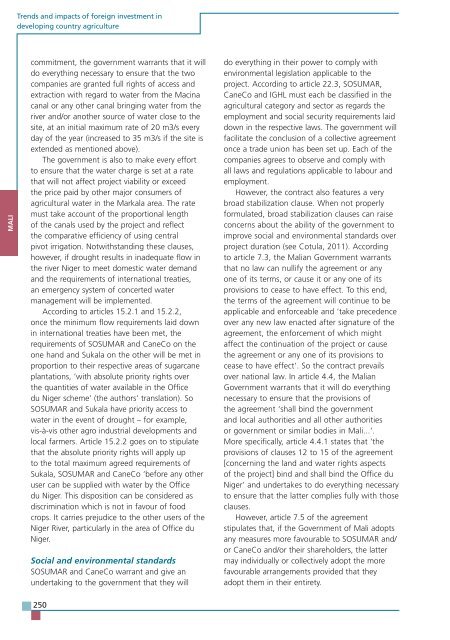TRENDS AND IMPACTS OF FOREIGN INVESTMENT IN DEVELOPING COUNTRY AGRICULTURE
TRENDS AND IMPACTS OF FOREIGN INVESTMENT IN DEVELOPING COUNTRY AGRICULTURE
TRENDS AND IMPACTS OF FOREIGN INVESTMENT IN DEVELOPING COUNTRY AGRICULTURE
You also want an ePaper? Increase the reach of your titles
YUMPU automatically turns print PDFs into web optimized ePapers that Google loves.
MALI<br />
Trends and impacts of foreign investment in<br />
developing country agriculture<br />
commitment, the government warrants that it will<br />
do everything necessary to ensure that the two<br />
companies are granted full rights of access and<br />
extraction with regard to water from the Macina<br />
canal or any other canal bringing water from the<br />
river and/or another source of water close to the<br />
site, at an initial maximum rate of 20 m3/s every<br />
day of the year (increased to 35 m3/s if the site is<br />
extended as mentioned above).<br />
The government is also to make every effort<br />
to ensure that the water charge is set at a rate<br />
that will not affect project viability or exceed<br />
the price paid by other major consumers of<br />
agricultural water in the Markala area. The rate<br />
must take account of the proportional length<br />
of the canals used by the project and reflect<br />
the comparative efficiency of using central<br />
pivot irrigation. Notwithstanding these clauses,<br />
however, if drought results in inadequate flow in<br />
the river Niger to meet domestic water demand<br />
and the requirements of international treaties,<br />
an emergency system of concerted water<br />
management will be implemented.<br />
According to articles 15.2.1 and 15.2.2,<br />
once the minimum flow requirements laid down<br />
in international treaties have been met, the<br />
requirements of SOSUMAR and CaneCo on the<br />
one hand and Sukala on the other will be met in<br />
proportion to their respective areas of sugarcane<br />
plantations, ‘with absolute priority rights over<br />
the quantities of water available in the Office<br />
du Niger scheme’ (the authors’ translation). So<br />
SOSUMAR and Sukala have priority access to<br />
water in the event of drought – for example,<br />
vis-à-vis other agro industrial developments and<br />
local farmers. Article 15.2.2 goes on to stipulate<br />
that the absolute priority rights will apply up<br />
to the total maximum agreed requirements of<br />
Sukala, SOSUMAR and CaneCo ‘before any other<br />
user can be supplied with water by the Office<br />
du Niger. This disposition can be considered as<br />
discrimination which is not in favour of food<br />
crops. It carries prejudice to the other users of the<br />
Niger River, particularly in the area of Office du<br />
Niger.<br />
Social and environmental standards<br />
SOSUMAR and CaneCo warrant and give an<br />
undertaking to the government that they will<br />
250<br />
do everything in their power to comply with<br />
environmental legislation applicable to the<br />
project. According to article 22.3, SOSUMAR,<br />
CaneCo and IGHL must each be classified in the<br />
agricultural category and sector as regards the<br />
employment and social security requirements laid<br />
down in the respective laws. The government will<br />
facilitate the conclusion of a collective agreement<br />
once a trade union has been set up. Each of the<br />
companies agrees to observe and comply with<br />
all laws and regulations applicable to labour and<br />
employment.<br />
However, the contract also features a very<br />
broad stabilization clause. When not properly<br />
formulated, broad stabilization clauses can raise<br />
concerns about the ability of the government to<br />
improve social and environmental standards over<br />
project duration (see Cotula, 2011). According<br />
to article 7.3, the Malian Government warrants<br />
that no law can nullify the agreement or any<br />
one of its terms, or cause it or any one of its<br />
provisions to cease to have effect. To this end,<br />
the terms of the agreement will continue to be<br />
applicable and enforceable and ‘take precedence<br />
over any new law enacted after signature of the<br />
agreement, the enforcement of which might<br />
affect the continuation of the project or cause<br />
the agreement or any one of its provisions to<br />
cease to have effect’. So the contract prevails<br />
over national law. In article 4.4, the Malian<br />
Government warrants that it will do everything<br />
necessary to ensure that the provisions of<br />
the agreement ‘shall bind the government<br />
and local authorities and all other authorities<br />
or government or similar bodies in Mali...’.<br />
More specifically, article 4.4.1 states that ‘the<br />
provisions of clauses 12 to 15 of the agreement<br />
[concerning the land and water rights aspects<br />
of the project] bind and shall bind the Office du<br />
Niger’ and undertakes to do everything necessary<br />
to ensure that the latter complies fully with those<br />
clauses.<br />
However, article 7.5 of the agreement<br />
stipulates that, if the Government of Mali adopts<br />
any measures more favourable to SOSUMAR and/<br />
or CaneCo and/or their shareholders, the latter<br />
may individually or collectively adopt the more<br />
favourable arrangements provided that they<br />
adopt them in their entirety.


